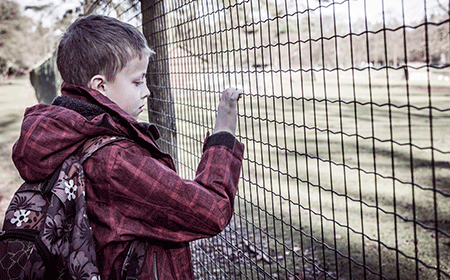Parents of children with autism often have to miss days at work, reduce their working hours or give up their job.
Those are the findings of research by charity Ambitious about Autism.
The charity surveyed more than 900 parents and carers of children and young people with autism. The aim was to find out about their experiences of the education system.

Exclusion from school: the survey reveals how deeply it affects working parents
Almost one in three give up working
The survey revealed the impact that school exclusions have on wider family life:
- 30 per cent of parents said they had given up their job as a result of school exclusions
- 29 per cent said they had missed days at work
- 20 per cent said they had reduced their working hours to part time.
Unlawful exclusions
Parents also reported an increase in the number of unlawful exclusions affecting their children. More than half (56 per cent) said schools had sent their child home early, put them on a reduced timetable or asked them not to come on a school trip without sending an official letter.
In 2016, nearly half (45 per cent) of parents of children with autism said their child had suffered an unlawful school exclusion.
Delays in assessment
The survey also revealed wider problems with how children with autism are able to access the right support at school. Around four in ten (nearly 40 per cent) of those who have a child with an Education, Health and Care (EHC) plan said they had waited more than 18 months for an assessment.
This was despite there being a 20-week statutory deadline for assessments. EHC plans place a legal obligation on local authorities to provide extra support for pupils with special educational needs.
Meanwhile, nine in ten (90 per cent) of the parents said they lost sleep because of the stress of getting their child the right support at school.

Jolanta Lasota: “The wider cost to families – and society – resulting from problems at school is very troubling”
‘It’s very worrying’
Jolanta Lasota is chief executive of Ambitious about Autism. She said: “Children and young people with autism and their families are being badly let down by our education system.
“It’s very worrying that parents are reporting an increase in ‘unofficial’ exclusions – such as children being banned from school trips or sent home early.
These add up to hundreds of hours of missed education, but they slip under the radar because they are not officially recorded. We must make sure schools are held to account if they break exclusions rules.
“The wider cost to families – and society – resulting from problems at school is very troubling. Parents are having to give up jobs to look after children forced out of education – creating even more stress and instability in their lives. We must work towards a more inclusive education system for the benefit of all.”
Earlier this year, Ambitious about Autism published findings on official exclusions. They showed that exclusions of autistic pupils have increased by nearly 60 per cent since 2011.
Recommendations
Ambitious about Autism supports several recommendations to tackle the growing rise in autism exclusions. These include:
- Ensuring Ofsted has the power to thoroughly investigate unlawful exclusions and take appropriate action.
- All school staff – including teaching assistants and support staff – should undergo training in understanding autism.
- Strengthening the accountability of the system to ensure schools and local authorities have incentives to support children with autism. For example, examining whether to make schools financially and academically responsible for children they exclude or place in alternative provision.
The charity is running a campaign called We Need An Education calling for a fairer deal for children and young people with autism in education. Click here to visit the charity’s campaign page.
Related:
- ‘Repugnant’ school exclusions banned
- Legal fight over exclusion for behaviour
- Schools ‘unable’ to stop exclusions
- MPs back call to cut school exclusions
- Excluded pupils develop mental problems
Published: 29 October 2018















